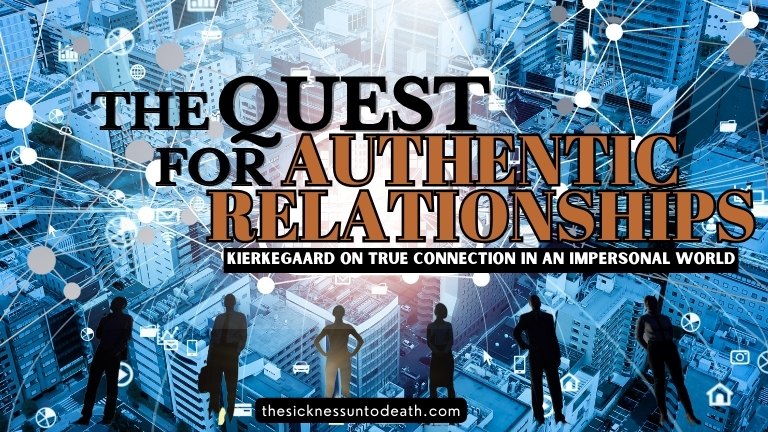In today’s fast-paced, digitally connected world, where interactions are often mediated through screens and measured by likes and follows, the quest for authentic relationships has become increasingly pressing. Søren Kierkegaard, a 19th-century Danish philosopher, provides timeless insights into the nature of true connections that transcend the superficial bonds that often characterise modern social interactions.
Kierkegaard’s Concept of Authentic Relationships
Kierkegaard believed that authentic relationships are founded on a profound understanding and acceptance of oneself and the other. He argued that true connection requires an individual to confront their own self, to delve into the depths of their being, and to emerge with a sincere self-awareness. This process is essential because, according to Kierkegaard, only those who truly know and accept themselves can genuinely love another.
The Superficiality of Modern Connections
Modern society, with its emphasis on social media and rapid communication, often prioritises quantity over quality in relationships. Connections are made quickly, often based on superficial commonalities or fleeting interactions. While these relationships can provide momentary satisfaction, they rarely offer the depth and fulfilment that come from authentic connections, which involve vulnerability, empathy, and a deep engagement with the other’s personal world.
Navigating Toward Authenticity
- Self-Reflection: The first step towards fostering authentic relationships is self-reflection. Kierkegaard emphasised the importance of self-examination as a pathway to understanding one’s true desires and values. By engaging in practices like journaling, meditation, or therapy, individuals can cultivate a deeper self-awareness that is crucial for genuine relationships.
- Prioritising Quality Over Quantity: In an age where social interactions can be overwhelming in their frequency yet lacking in depth, choosing to focus on fewer, more meaningful relationships can be more fulfilling. This involves spending more time cultivating deeper connections with fewer people rather than spreading oneself thin across many superficial interactions.
- Embracing Vulnerability: Authentic relationships require vulnerability. This means sharing one’s fears, hopes, and dreams, and also being receptive to the vulnerabilities of others. It involves a mutual exchange of authenticity, where both parties are willing to remove their social masks and reveal their true selves.
- Active Listening: True connection is fostered through active listening, which involves fully focusing on the speaker, understanding their message, and responding thoughtfully. Active listening shows a genuine interest in the other person’s thoughts and feelings, thereby deepening the relationship.
- Consistent Effort and Patience: Authentic relationships require time and effort to develop. They are not built overnight but are formed through consistent interactions and shared experiences that build trust and understanding over time.
The Role of Authentic Relationships in Modern Society
Authentic relationships serve as an antidote to the alienation and loneliness that can arise in a highly impersonal world. They provide a sense of belonging and understanding that superficial connections cannot. In fostering true connections, individuals not only enrich their own lives but also contribute to a more empathetic and cohesive society.
Conclusion
Kierkegaard’s insights into the nature of authentic relationships challenge us to rethink our approach to connection in the modern world. By striving for deeper self-awareness, embracing vulnerability, and prioritising meaningful interactions, we can cultivate relationships that offer true fulfilment and support in navigating the complexities of life. In doing so, we not only counter the impersonality of the modern age but also rediscover the joy and richness of genuine human connections.

